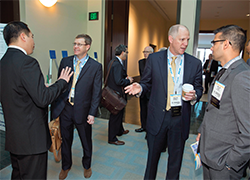Dr. Brackmann said those kinds of figures bolster the case against rushing in and removing tumors. “If you had good hearing at diagnosis, the majority of them maintained good hearing,” he said. “So if you have a tumor, the first thing to do is to not—like we did in the old days, jerk reaction—take it out. That’s not reasonable anymore.”
Explore This Issue
June 2015He noted, however, that hearing did decline even among those whose tumors didn’t grow. “If tumors grow or not for reasons that are not understood, hearing does decline,” he said. “So that’s something to consider when you’re making recommendations for treatment.”
In a study out of Denmark, a country in which all tumors are treated at the same center, allowing for a large cohort of more than 2,000 patients, there is further evidence in favor of observation, he said (Otol Neurotol. 2010;31:271-275). At the center, tumors larger than 2 cm are treated immediately. If they’re smaller than 2 cm, they’re observed. “And only 20% of their tumors grew that required treatment,” Dr. Brackmann said. “They did have deterioration of hearing, but, like our study, those who had normal hearing at diagnosis had hearing preservation over the long term.”
At the House Clinic, observation is the course taken in elderly patients with small or medium-sized tumors, and for small and medium tumors with poor hearing at any age. Treatment is given if the tumors exhibit growth, Dr. Brackmann said. Exceptions are made for large tumors and in cases of small tumors in young patients, he added.
Indications for stereotactic radiation are patients with a poor surgical risk due to age or medical condition who have a growing tumor of smaller than 3 cm, tumors smaller than 3 cm with little doubt of the diagnosis after imaging, and younger patients who refuse to undergo surgery.

Attendees gather outside the exhibit hall at COSM 2015.
Dr. Brackmann noted that much of the push for gamma knife surgery performed upon diagnosis of vestibular schwannomas stems from a study out of France led by Jean Regis, MD, professor of neurosurgery at Aix Marseille University (J Neurosurg. 2013;119 Suppl:105-111). In the study, 47 patients treated with a “wait and see” approach had an average follow-up of 43.8 months. Tumor growth or hearing deterioration constituted a failure, according to the study’s parameters. Another 34 patients underwent gamma knife surgery. A total of 35 of the 47 (74%) wait-and-see patients experienced tumor growth and required treatment. Only one of the 34 patients (3%) in the surgery group had an outcome considered a failure.